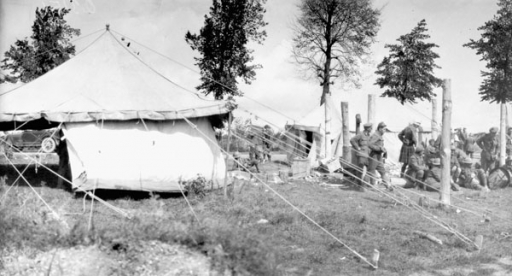The American-born novelist, Raymond Chandler, enlisted with Canadian forces during the First World War, and suffered concussion near Arras 100 years ago, on 19 June 1918. US historian Chris Dickon explains how Chandler’s experience of the trenches may have influenced his writing, immortalised in the stories of his tough-guy detective, Philip Marlowe.
Raymond Thornton Chandler had not gotten himself into war out of any great conviction, and certainly not to become a leader of men. He was a man of complicated origin. He had been born in Chicago of an alcoholic father and an Irish mother who took her American son back to Ireland where, in trying to start his adult life, he became a British citizen and eligible for work in the civil service.
He really wanted to be a writer, however, and moved to California in 1912 to try to get that going, but without much success. Restless in August 1917, he saw the war in Europe as perhaps a good change in course. He traveled north to Victoria, British Columbia and signed up with Canadian forces. It may have been that this American/British hybrid was prompted to join with Canadian forces mostly because Canadian compensation for dependants was higher and he now had a mother to help support in Los Angeles.
By November of 1917, he was training in Sussex with the British Columbia Regiment, and in March 1918 he was in the trenches near Arras, France. His battalion had suffered great losses since 1915, and he ran quickly up the replacement chain to become a non- commissioned commander of 30 men. In fighting on June 19, 1918, his military career was altered with a concussion suffered from German shelling that, by some accounts, killed everyone else in his platoon.
Royal Air Force
While convalescing in England he trained to be a pilot for the Royal Air Force, but the war ended before he would ever fly. It was during this time that Chandler took up the drinking that would haunt him for the rest of his life, and an unpublished piece of writing about the moment of concussion in a dark trench became the point at which many critics believed he embarked on the style of writing that would take him to the 1930s exploits of his fictional detective Philip Marlowe in noir Los Angeles.
‘The strafe started a lot heavier than usual. The candle stuck on the top of his tin hat guttered from something more that draught. The rats behind the dugout lining were still. But a tired man could sleep through it. He began to loosen the puttee on his left leg. Someone yelled down the dugout entrance and the beam of an electric torch groped about on the slimy steps. As he pushed aside the dirty blanket that served for a gas curtain the force of the bombardment hit him like the blow of a club at the base of the brain. He groveled against the wall of the trench, nauseated by the din. He seemed to be alone in a universe of incredibly brutal noise. Time to move on. Mustn’t stay too long in one place’.(1)
Chandler emerged from the Great War with the rank of Sergeant. Years later, he wrote to one of his fans:
Courage is a strange thing. You can never be sure of it. As a platoon commander very many years ago, I never seemed to be afraid, and yet I have been afraid of the insignificant risks. If you had to go over the top somehow all you seemed to think of was trying to keep the men spaced, in order to reduce casualties. It was always very difficult, especially if you had replacements or men who had been wounded. It’s only human to want to bunch for companionship in face of heavy fire. Nowadays war is very different. In some ways it’s much worse, but the casualties don’t compare with those in trench warfare. My battalion (Canadian) had a normal strength of 1200 men and it had over 14,000 casualties’.(2)
It was a rare letter from Raymond Chandler. Like many men, he did not like to talk about the worst moments of war. It would be Philip Marlowe who would play out its effect in the violence, detachment and dark corners of the stories and novels that were to follow.
Chris Dickon is author of Americans at War in Foreign Forces, published in 2014, and a recent biography of the World War I poet Alan Seeger.
1.Raymond Chandler: A Biography, Tom Hiney, Grove Press 1999, p 44 from Raymond Chandler Papers, Bodleian Library, Oxford University
2.The Life of Raymond Chandler, Frank McShane, E.P. Dutton, 1976, p 29
Images: Dept. of National Defence, Canada / Library and Archives Canada / PA-040224
